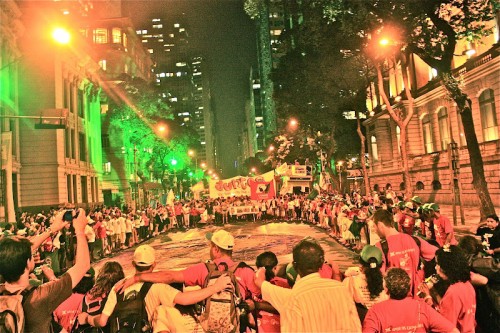Check translation:

Waste pickers with the MNCR and from around the world embrace around the MNCR flag at the People’s March.
Solid waste and social inclusion
- Create laws, fiscalize and comply with national laws that control solid waste treatment that guarantees the social inclusion of waste pickers.
- Elimination and prohibition of incinerators, thermoelectric plants and other energy technologies that pose risks to health and the environment.
- Invest in projects that transform organic waste into energy, work with city governments to install recycling collection and support waste picker cooperatives and associations, contracted for the recycling services they provide.
- Install civil construction waste plants, with cooperatives, to account for the pollution created by this sector.
- Develop “Reverse logic” programs – companies and distributors must send recyclable materials to waste pickers’ associations and cooperatives and pay them for the service provided.
- Invest in environmental education … and include as part of basic educational curriculum themes related to waste treatment.
Other demands include education, biodiversity, health, water, public safety, agriculture, sanitation, youth rights, animal rights, and world peace. Some highlights from this section:
- Environmental education programs at every school and the training of teachers in the topic of environmental education.
- Ecological and economic zoning needs to be highly conservationist.
- Increase the efficiency of SUS – the public health system in Brazil – reducing wait times for specialist care.
- Implement an emergency plan for revitalizing urban and rural rivers.
- Increase environmental politicing and working with citizens to prevent and enforce environmental crimes.
- Tax companies whose products contain pesticides.
- Enforce organic consumption, especially among children.
- Install – in partnership with cities and states – licensed landfills that meet waste demand.
- End weapons manufacturing and trade.
- Phase out cigarette production.
- Phase out pollution-producing vehicles.
Tweet
Comments Off on MNCR: Summary of MNCR’s Collective Demands
Comments RSS feed for this post.


